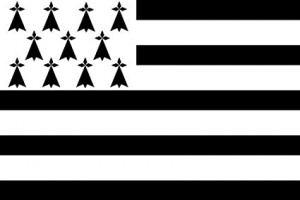Language/Breton/Grammar/Give-your-Opinion
Hi Breton learners! 😊
In this lesson, we will learn how to give your opinion in Breton. We will look at the different ways to express your opinion and how to use them in a sentence.
Expressing Your Opinion
Giving your opinion in Breton is quite simple. There are two main ways to do it: using the verb kaout or using the phrase soñjal a ran.
The verb kaout is used to express an opinion about something that you think is true. It is usually followed by the word eo, which means "that". For example:
- Kaout a ran eo mat - I think it's good.
The phrase soñjal a ran is used to express an opinion about something that you think is not necessarily true. It is usually followed by the word e which means "that". For example:
- Soñjal a ran e teuio an amzer da vezañ gwelloc'h - I think the weather will get better.
Examples
| Breton | Pronunciation | English Translation |
|---|---|---|
| Kaout a ran eo mat | kaʊt aran ɛw maːt | I think it's good |
| Soñjal a ran e teuio an amzer da vezañ gwelloc'h | soɲal aran ɛ təwjo ɑn ɑmzɛr da vɛzɑ̃ gwɛlɔx | I think the weather will get better |
Quiz
Test your knowledge of expressing opinions in Breton with the following quiz:
1. How do you say "I think it's bad"? A. Kaout a ran eo fall B. Soñjal a ran eo fall C. Kaout a ran e teuio an amzer da vezañ gwelloc'h D. Soñjal a ran e teuio an amzer da vezañ gwelloc'h
2. How do you say "I think the weather will get worse"? A. Kaout a ran eo fall B. Soñjal a ran eo fall C. Kaout a ran e teuio an amzer da vezañ gwelloc'h D. Soñjal a ran e teuio an amzer da vezañ gwelloc'h
3. How do you say "I think it's good"? A. Kaout a ran eo fall B. Soñjal a ran eo fall C. Kaout a ran e teuio an amzer da vezañ gwelloc'h D. Soñjal a ran e teuio an amzer da vezañ gwelloc'h
Answers: 1. A, 2. D, 3. A
Conclusion
Now you know how to express your opinion in Breton. To improve your Breton Grammar, you can also use the Polyglot Club website. Find native speakers and ask them any questions!
➡ If you have any questions, please ask them in the comments section below.
➡ Feel free to edit this wiki page if you think it can be improved. 😎
Related Lessons
- Gender
- Adjectives
- Conditional Mood
- Plurals
- Negation
- Personal Pronouns
- Questions
- Future Tense
- Pronouns

